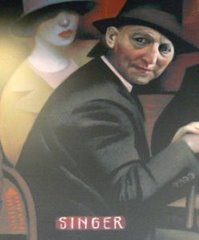
The replication of the tomb itself, the incredibly ornate coffins stacked one inside of another like Russian nesting dolls, the golden treasures placed upon the dead body of the 19-year-old king who the people saw as an intermediary between the gods and ordinary man. The bejeweled necklaces, the golden dagger placed on his chest as protection during the dangerous journey through the underworld. The gleaming amulets and startling animal fetishes. The representations of food that would spring to life all juicy and tasty to nourish the boy king. The jars of viscera, the golden crown, the throne of ebony. The glittering statues of the mighty Horus and the elegant Isis. The 22-pound solid gold burial mask. It was all so gaudy and ghoulish and astoundingly hopeful in its vision of a perfect life beyond.

When Tut’s tomb was uncovered, archeologists found hundreds of doll-like figurines called “shabtis,” which Tut would be able to summon as servants if he felt like slacking off when called upon to cook or garden or clean in the kingdom of the gods. To keep him company too, I suppose.

It reminded me of a few days earlier, looking down at my lifeless father in his coffin, his skin yellowed, his distinctive mustache that tickled his grandchildren during kisses now without its incessant twitching. My daughter Gwen had brought along a small white Beanie Baby seal that she had sent to him a month earlier for comfort when the cancer had spread into his brain and he no longer had words or much memory. My mom said that when it arrived in the mail, he placed it under his chin and fell asleep with it there. Now Gwen handed the soft, soft toy to my mother who placed it on his chest. Dad and the seal seemed to be eye-to-eye, a Beanie Baby shabti to do his tidings. My 9-year-old niece Brianna placed into the coffin a piece of paper with a poem she wrote. The part I remember most: My pop-pop taught me to never cry if you lose at poker. I love my pop-pop.
My mother, married to dad for 56 years, leaned over the coffin and left the scent of the perfume that he always loved. “He never called me his wife,” she said. “I was always his bride.”

No comments:
Post a Comment